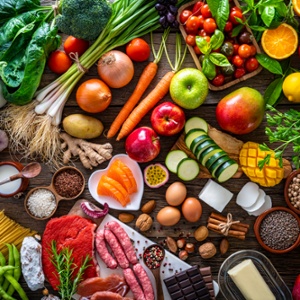More than ever, with the rising cost of living, balancing the bills and having a healthy balanced diet can be challenging. Healthy food can be more expensive, and often money-saving deals are available for less healthy items. This can make accessing healthier food more difficult. The budgeting and food support available to you can help make your food budget a little more manageable.
Food budgeting
You may already have a good understanding of your household budget, which can help you work out and manage your food budget. If you want to review or get in control of budgeting, there are practical tools that might help you.
Money Helper UK has a budget planner that can take you through all the steps to work out your household budget, including your food budget. Once you know your food budget, you can plan a little easier.
Food support
If you are struggling to access food, here are a few places that you can contact for help:
- Welsh Government - Get help with the cost of living
- Citizens Advice - Get help with the cost of living
- The Trussell Trust
Healthy start provides food and milk vouchers if you are pregnant or have children under four and qualify for certain benefits. You can check if you are eligible here.
There may be other support available locally. As local areas offer different things, you could search online to find the support available in your area. Try using the following searches; local food bank, local food pantry, community fridge, community food hub, local food centres and local lunch club.
You might also be interested in the Olio App, which shares surplus food from local businesses for free to reduce food waste. You can check what is available locally here.
Money saving options
Once you know you have accessed the support and resources available that you need, there are practical ways to keep costs a little lower when shopping and cooking.
Shopping
-
Plan your meals and make a shopping list. This helps you buy only what you need.
-
Use ingredients you already have at home. Check whilst you are making your shopping list.
-
Shop when not hungry or tired if you can. Shopping when we are hungry may lead to buying foods that are higher in fat and sugar.
-
Stick to your list. Check your basket before paying and remove items not on the list.
-
Look for value brands which are often cheaper.
-
Cheaper products are often not in central or prime positions in the shops – check the top and bottom shelves.
-
Special offers are not always cheaper – check the label to ensure you save money and only buy what you need.
-
Look for seasonal fruit and vegetables, which may be cheaper.
-
Many supermarkets now sell ‘wonky’ fruit and veg boxes which are slightly different in shape from usual but are cheaper, just as healthy and taste just as good.
-
Frozen and tinned fruit and vegetables are just as healthy as fresh but can be stored longer and are often cheaper. Try to choose fruit tinned in juice and vegetables tinned without added salt if you can.
See our healthier shopping page for more information.
Cooking
-
Cook at home when you can, and take a homemade lunch or picnic when you are out.
-
Batch cook your meals and freeze them in portions if you can.
-
Beans, pulses and lentils are great ways to bulk meals and can often be bought with money-saving deals.
-
Reduce the amount of meat you cook, and replace it with vegetables, beans, lentils and pulses.
-
Some cooking methods are cheaper than others; try making one pots or using the microwave instead of the oven.
-
If you have a smart meter, it can help monitor your cooking costs at home.
See our making everyday meals healthier page for more information.
If you need help with food budgeting, try using the budget planner to work out your budget.
If you think you could make some practical changes to your shopping or cooking, make a list and set yourself a shopping or cooking goal.






